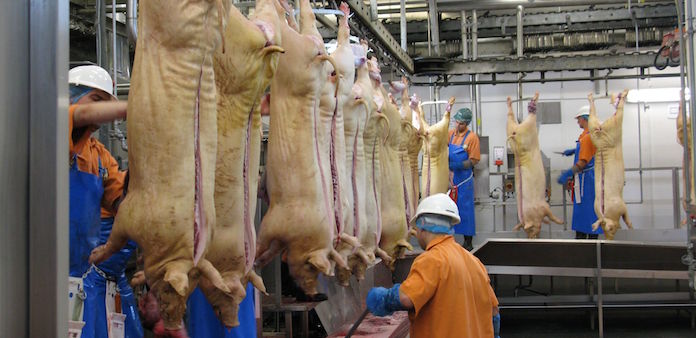Lacklustre production is driving higher EU pig prices, according to AHDB analysis.
In the week ended August 18, EU pig prices continued to rise to a multi-year high at €180.06/100kg. This was €7 higher than at the beginning of August. The German price topped €190/100kg, equating to about 176p/kg.
European production has been lacklustre, particularly in Germany, Europe’s largest producer, which has helped support prices. EU pig meat production fell by 4% in May compared to the previous year, to just over 1.9 million tonnes, according to the latest Eurostat figures. Slaughter was also down 4% on the month last year, to 21 million head, indicating broadly stable carcase weights.
Growth in Chinese demand also seems to be re-emerging, with record prices recorded in August as the impact of ASF-related herd losses feeds through – Chinese wholesale pork prices are now in excess of 30RMB/kg, (€3.78), up from around 20RMB two months ago.
“However, the market signals are not wholly price supportive,” AHDB analyst Jenny Tanner said. “Demand has been reported to be lower than expected across much of Europe, particularly the north. Processor margins are reported to be suffering, caught between a scarcity of pigs and weaker demand. This may affect the sustainability of price rises, especially if production starts to pick up. Companies with access to China are likely to be in a more favourable position.”

Reference prices in selected key Member States moved as follows in the four weeks to 18 August:
- Belgium: +€12.3 to €157.70/100kg
- Denmark: -€0.3 to €168.88/100kg
- France: +€4 to €168.00/100kg
- Germany: +€10.7 to €191.32/100kg
- Netherlands: +€13.4 to €171.78/100kg
- Poland: +€5.9 to €177.28/100kg
- Spain: +€0.5 to €181.64/100kg
- UK: -€3.0 to €166.37/100kg
On average, EU pig prices have continued to extend their premium over UK prices during August, and were over €13/100kg higher in week end August 19. Some weakening of sterling against the euro over the past month has influenced this.
“If European prices remain strong, then the SPP would normally be expected to follow, but only at its own pace,” Ms Tanner said.




